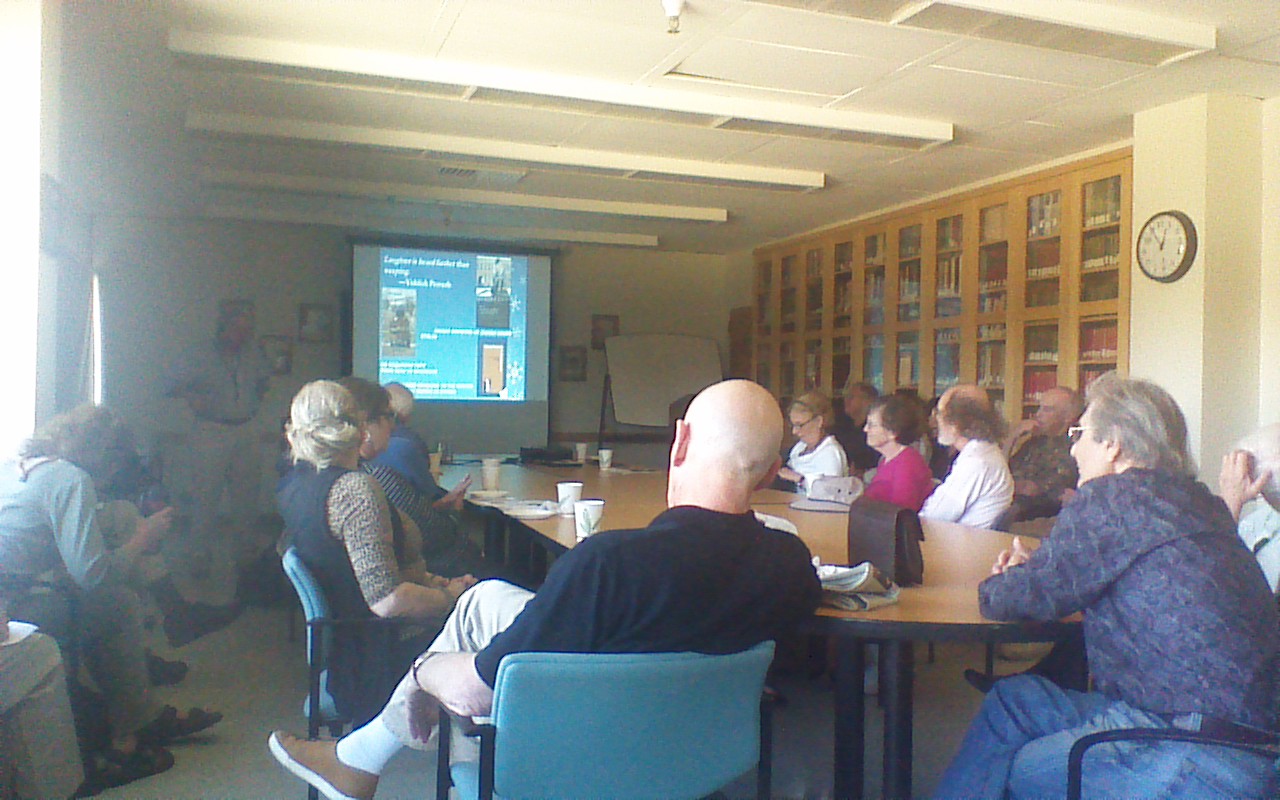“Rabinovich [the recurring butt of Russian-Jewish jokes] is taken into custody by the KGB. ‘Why
do you want to leave the best country in the world?’ the KGB agent asks him.
Rabinovich responds, ‘Well, I only have two reasons. My neighbor keeps knocking
on my door in the middle of the night, yelling ‘Just wait, the Soviet Union
will deal with you Jews!’ The thing is…I don’t want to wait!’ The KGB agent
laughs, ‘What are you talking about? It’ll be forever before we get to Jews!’
Rabinovich looks at the KGB agent. ‘And that would be my second reason!’”
This classic joke is the epitome of Jewish humor in Soviet Russia, as described by Emil A. Draitser, Professor of Russian at Hunter College of CUNY and author of Shush! Growing Up Jewish Under Stalin and From Here to Wherever: A Novel of Odessa. Many jokes, such as the one described, were the crux of his event “Laughing all the Way to Freedom: Social Functions of Jewish Humor of Modern-day Exodus” at UCLA, held on Tuesday, Nov. 14 at 12 p.m. in Bunche Hall. During the event, Draitser showed that Jewish joke lore in Soviet Russia served several important functions: to remind the Jewish community of the volatile situation around them, to differentiate the Jewish in-group from their surroundings, and to instill pride in Israel.
As the crowd sat around the long table in the small presenting room on the 10th floor of Bunche Hall, Draitser entered the discussion of the function of Jewish jokes as a means to remind people of the hostile situation living under the Soviet Union.
First and foremost, Draitser discussed how the oppressive situation revolved around that idea that the Jews living under the Soviet Union were living in a police state, riddled with anti-Semitic sentiment that embedded itself in every social institution, hindering Jews from getting a higher education and obtaining steady employment. “It said on your passport that you were a Jew,” Draitser related. He explained that there was a “nationality” section in the passport which categorized “Jew” apart from all other nationalities. Professor Draitser discussed several jokes regarding the great length that Jews would sometimes go to just to alter their “nationality.”
“’Look, Rabinovich, I changed my nationality to Russian,’ says Rabinovich’s friend. Rabinovich responds, ‘Don’t worry — when the pogroms [violent massacres of Jews] start, they’ll be beating you on your face, not your passport.’” The sentiment presented is not only one of disdain for lying and trying to alter one’s own identity but the sheer impracticality of doing so. It was this recurring “impracticality” in the jokes that served a function to marginalize, or isolate, the Jews. Draitser explained this isolation as having a resulted out of the sense of fear the Jewish people felt, as if they were living on the brink of death , which in turn, strengthened Jewish community bonds by isolating them from their hostile environment.
The final purpose of Soviet-Jewish jokes that Draitser discussed was to touch base with and instill pride in Israel. When the USSR went to war with Israel, still in its early stages, it was common to hear: “Our radio is saying that our planes have shot down our missiles!” Draitser explained that this statement showed the dual identity expressed in the eyes of many Soviet Jews. They did live in the Soviet Union, so the radio and the missiles were “ours” (Soviet) but the planes were also “ours” (Israeli), an example of how Israel shot down Soviet missiles fired from Syria during the 1967 Six-Day War (and even after its resolution). Even though the Soviet Jews did not actually live in Israel, they identified with the country and longed to emigrate to it because of anti-Semitism in the Soviet Union. However, they were prevented from doing so for much of the 20th century, due to the Iron Curtain and strict emigration laws.
Pride in Israel, the differentiation of the Jewish community, and emphasis of the oppressive situation were all functions of the expansive Jewish jokes during the Soviet Union. These underlying sentiments apply to almost all Jewish joke lore around the globe, which has the same purpose today as it had in Stalinist Soviet Russia — to help the Jew fight on and thrive no matter how harsh the surroundings. So the next time you hear a Soviet-Jewish, Yiddish, or American-Jewish joke, think about what it stands for and it may actually be speaking to you from hundreds or thousands of years ago to remind you of who you really are.
*****
“Jews United” is a 3-part Series identifying and expressing the concepts of the Jewish Identity, the Jewish Spark, and how they relate to the importance and survival of Israel and the Zionism behind it. Check out Part 1—“Jewish Refugees in Shanghai symposium expresses Jewish identity” online at Haam.org. Part 3 can be found in Ha’Am’s Fall 2013 Print Issue.

